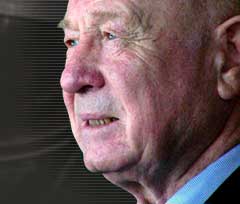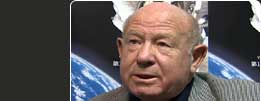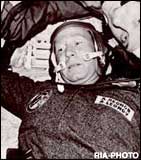 |
 |
|||
| Born on May 20, 1934, Alexei Arkhipovich Leonov became a cosmonaut after serving as an air force pilot. Aboard the Voskhod II, he conducted the first ever space walk (extra-vehicular activity, or EVA) in March, 1965. In July, 1975, he participated in the Apollo-Soyuz Project, a successful orbital docking conducted jointly by the United States and the Soviet Union. He was named Hero of the Soviet Union, and subsequently held such positions as director of Yuri Gagarin Cosmonaut Training Centre. He is also a founding member of the Association of Space Explorers, and served as co-chairman, with John Fabian, of its 18th Congress, which took place in Japan in October, 2002. He is married with two daughters, and known for his skills as a painter. |  |
  File size : 4.9MB Format : MPEG |
 Q. The term "space walk" has been translated into Japanese as "space swimming," which gives people an impression that it is something enjoyable. But that's far from the truth, isn't it?  A. The term "extra vehicular activity" describes our work better than the term "space swimming." We have to work in a severe environment where the difference in temperature between places in the sunlight and those in the shade is massive - 150 degrees centigrade and minus 140 degrees centigrade respectively. In this kind of severe environment, a breakdown of the spacesuit would mean 100% death. The area where extra-vehicular activities are conducted is only two square meters, but a hit from even a five-gram meteor would lead to inevitable death, though the probability of such a hit is less than one in a billion. A. The term "extra vehicular activity" describes our work better than the term "space swimming." We have to work in a severe environment where the difference in temperature between places in the sunlight and those in the shade is massive - 150 degrees centigrade and minus 140 degrees centigrade respectively. In this kind of severe environment, a breakdown of the spacesuit would mean 100% death. The area where extra-vehicular activities are conducted is only two square meters, but a hit from even a five-gram meteor would lead to inevitable death, though the probability of such a hit is less than one in a billion. |
||||
|
|||||